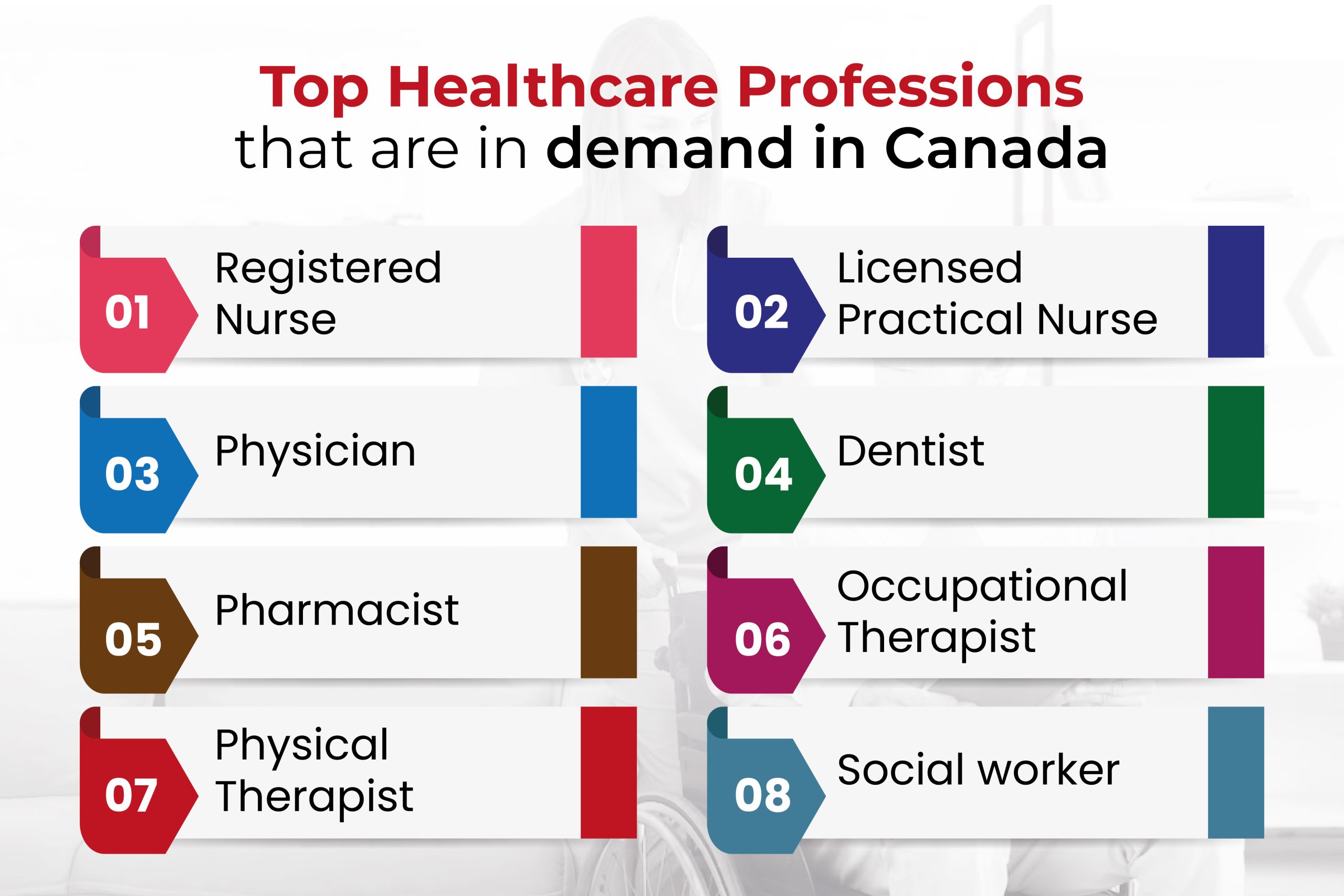Thinking about a nursing career in Canada? This is the right time to invest in one.
Nurses, among the most sought-after professions for the next decade, play a vital role in Canada’s healthcare sector. Looking ahead to the future of nursing in Canada, it’s imperative to navigate the evolving landscape of this noble profession. While 2024 marks a significant milestone, the journey for nurses in Canada extends beyond this point, offering promising prospects on the horizon, particularly for those aiming to immigrate to Canada as a nurse.
In this blog, we are going to discuss nursing profession trends in 2024 and nursing job growth projections.
Current Landscape of Nursing in Canada 2024
Canada’s healthcare system is renowned for its excellence and is supported by a strong nursing workforce. The demand for skilled nurses continues to grow, driven by factors such as an ageing population, advances in healthcare technology, and the need for specialized care.
Let’s talk about the nursing pathway in Canada that will help you to get an idea about your future.
Nursing pathway in Canada
With the Canadian nursing license program, you can facilitate connections with employers, enabling individuals to secure job and pursue opportunities in Canada. Along with a competitive pay scale, you can also bring your spouse and child with you to Canada.
To be eligible for the program, you must have worked as a nurse for at least one year within the past five years.
This is a golden opportunity to settle with your family in Canada.
The Canada government is expecting an influx of nurses in the country to fill the increasing demand for overseas nurses. This means that there are plenty of job opportunities for those who want to work as a nurse in Canada.
Key pathways to immigrating to Canada as a nurse:
Express Entry
Nurses are eligible to apply for Express Entry under either the Federal Skilled Worker Program (FSW) or the Canadian Experience Class (CEC) if they meet the program requirements. For the FSW program, candidates must have at least one year of continuous work experience in a skilled occupation within the past 10 years, which can include work experience completed abroad.
Qualified candidates can create a profile in the Express Entry pool, where they are assigned a Comprehensive Ranking System (CRS) score out of 1,200. The highest-ranking candidates in the pool are then invited to apply for permanent residence through Invitations to Apply (ITAs).
The Express Entry system, known for its efficiency and effectiveness in managing Canada’s immigration applications for skilled workers, has evolved to include category-based rounds of invitations, where nurses can apply and be selected even with a low CRS score.
One of the key benefits of the Express Entry system is its efficiency. If invited to apply for permanent residence, applicants can have their application processed in as little as six months.
Provincial Nominee Program
Another immigration pathway available for nurses to move to Canada is through a Provincial Nominee Program (PNP). PNPs are immigration programs managed jointly by provincial and federal governments. Each province in Canada has its own PNP with various streams, but all PNPs ultimately lead to Canadian permanent residence.
Some PNPs are exclusively for candidates already in the federal Express Entry pool. Being nominated through one of these PNPs adds 600 CRS points to your profile, almost guaranteeing an Invitation to Apply (ITA).
Many PNPs require candidates to have a connection to the province, such as family residing there or past experience studying or working in the province. Other PNPs focus on addressing skills shortages in the province by accepting skilled workers with experience in high-demand occupations.
Future Trends
Looking beyond 2024, several key trends are expected to shape the nursing profession in Canada. One of the most notable trends is the increasing focus on community and home-based care. As the population ages, there will be a greater need for nurses to provide care outside of traditional hospital settings.
Another trend is the rise of technology in healthcare. Nurses will need to adapt to new technologies such as telemedicine and electronic health records, which will change the way care is delivered and managed.
Opportunities for Growth
Despite these challenges, the future looks bright for nursing in Canada. There will be a lot of opportunities for growth and advancement, with roles available in a variety of settings, including hospitals, clinics, long-term care facilities, and community health centers.
Key Takeaways
- The future of nursing in Canada is bright, with lots of opportunities for growth and advancement.
- Nurses will need to adapt to new technologies and care models to meet the evolving needs of the healthcare system.
- Continuing education and professional development will be very important for staying current and competitive in the field.
In conclusion
The future of nursing in Canada is full of promise and opportunity. By staying informed and adapting to change, nurses can continue to thrive and make a meaningful impact on the healthcare landscape for years to come.
Kickstart your nursing career in Canada with CanApprove
We have been providing immigration services for more than 25 years since 1998 and we provide personalized consultation, document preparation, application assistance, and ongoing support throughout the process.
Why should you choose CanApprove?
- 25+ years of Excellence
- Governed by veteran immigration attorneys
- Registered CICC immigration consultancy
- Headquartered in Canada
- 15,000’s of success stories
What do we offer at CanApprove?
- Free counselling and assessment process
- Complete assistance through the visa process
- Visa filing and Documentation
- Post landing services
Are you ready to migrate to Canada but confused? Our Canada immigration coordinator is just a click away to help you. Connect now to kick off your Canadian immigration process! You’ll receive industry-best immigration assistance that will make all your efforts worthwhile.
What are you waiting for? Click the link now! Contact CanApprove
Connect with CanApprove right away and get a 100% FREE consultation!






